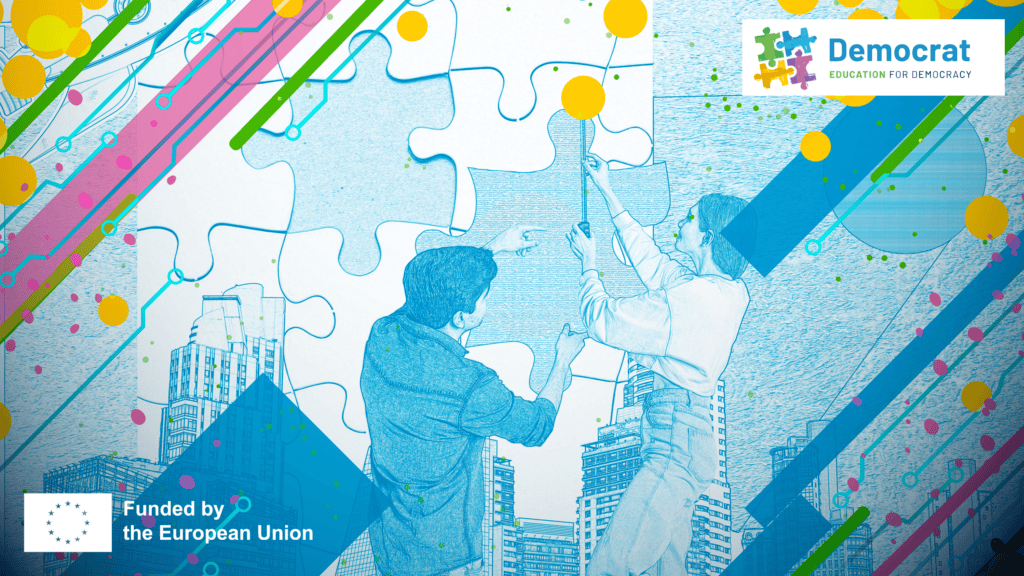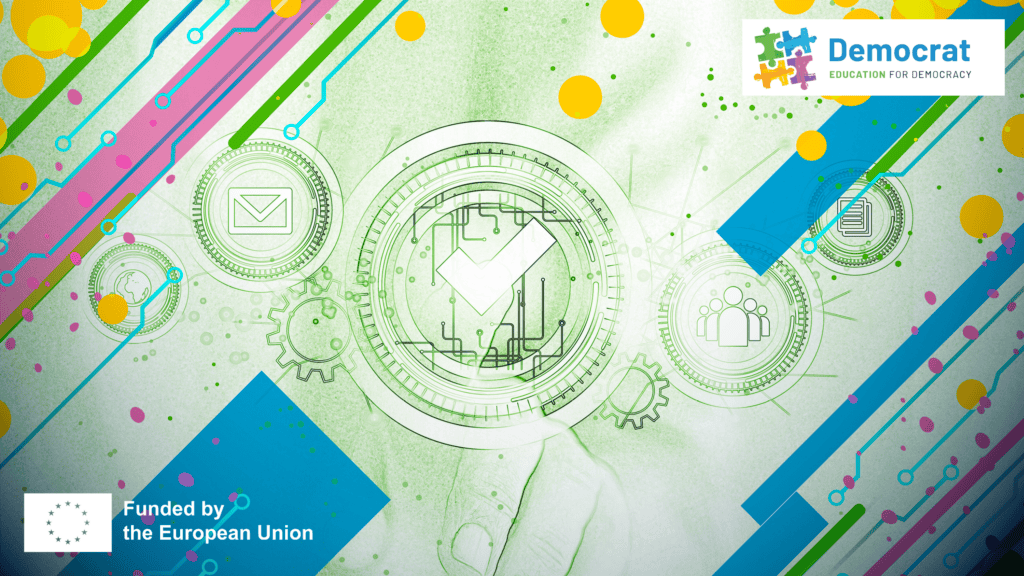Strengthening Democracy Through Education for Democracy: Policy Recommendations from the DEMOCRAT Project

Table of Contents
Building a Democratic Future with Education
In today’s world, democracy faces a unique set of challenges, from the spread of misinformation to political polarization and global crises like climate change. As these issues evolve, so does the need for a well-informed and engaged citizenry. Education for Democracy (EfD) is one of the most effective ways to address these challenges, by equipping young people with the values, knowledge, and skills necessary to participate in democratic life. The EU-funded DEMOCRAT project is working to make this vision a reality. By developing a Competence Framework for Responsible Democratic Citizenship, creating a European curriculum, and testing practical learning methods in schools, the project aims to ensure that future generations are prepared to uphold democratic principles.
Here is a summary of policy recommendations based on the DEMOCRAT project’s research and findings, which can help guide education systems and policymakers in implementing effective democratic education.

Policy Recommendations for Strengthening Education for Democracy
1. Develop a Coherent Competence Framework for Responsible Democratic Citizenship
To prepare students for the complexities of democratic life, it’s crucial to have a structured framework outlining the skills and competencies needed for democratic citizenship. The DEMOCRAT project recommends creating a Competence Framework focused on four key areas:
- Solidary Participation: Encourage students to engage actively with others and to support collective well-being.
- Deliberation: Equip students with the skills to discuss differing viewpoints respectfully and thoughtfully.
- Judgment of Information: Promote critical thinking to help students assess the reliability and accuracy of information.
- Democratic Resilience: Instill a commitment to democratic principles, even in challenging times.
This framework provides a foundation that schools across Europe can adopt and adapt, helping students develop the skills necessary to engage actively in democratic life.
2. Integrate Democratic Values Across the Curriculum
Democratic education should not be confined to a single subject; instead, democratic principles and values should permeate the entire curriculum. The DEMOCRAT project recommends creating a European Curriculum for Education for Democracy that incorporates democratic competencies into various subjects. For example:
- In science classes, students can explore environmental responsibility and sustainability.
- Social studies can include discussions about global citizenship and human rights.
- Language and literature classes can encourage empathy by engaging with diverse perspectives and narratives.
This cross-disciplinary approach ensures that students encounter democratic principles in multiple contexts, making these values a part of their overall learning experience.
3. Make Schools “Laboratories of Democracy”
To foster a deeper understanding of democratic values, schools should function as “laboratories of democracy.” This means creating opportunities for students to practice democracy within their school environment, such as:
- Student councils where students can experience governance firsthand.
- Debates, group projects, and community initiatives that promote collaborative problem-solving.
- Engagement with local or national issues through projects that connect with the community.
By integrating democratic practices into daily school life, students can see democracy in action and understand the value of active participation and shared responsibility.
4. Implement Local Pilot Projects for Practical Testing
The DEMOCRAT project advocates for the use of pilot projects to test the proposed curriculum and teaching methods in real-world settings. By implementing these projects in schools across different countries, educators can gather practical feedback and refine their approaches to Education for Democracy. Key elements for successful pilot projects include:
- A diverse range of democratic activities, such as environmental advocacy, social justice projects, and historical analysis.
- Opportunities for student involvement in school governance or local decision-making processes.
- A focus on hands-on learning, allowing students to experience the impact of their civic engagement.
These pilot projects not only provide valuable data for developing effective democratic education but also offer students the chance to engage meaningfully with real-world issues.
5. Establish National and Transnational Living Labs
Living Labs are collaborative spaces where educators, students, policymakers, and community members can work together to develop and refine democratic education strategies. The DEMOCRAT project has created Living Labs in six countries—Estonia, Finland, Germany, Ireland, Poland, and Spain—as well as a Transnational Living Lab that connects these national efforts. Policy recommendations for Living Labs include:
- Engaging stakeholders from all levels, including students, teachers, parents, and local authorities, to create a sense of shared responsibility.
- Offering workshops, discussions, and feedback sessions to address specific challenges in democratic education.
- Using both in-person and online platforms to keep the community engaged and ensure that insights and best practices are shared widely.
Living Labs encourage active community involvement, fostering a supportive environment for democratic education to flourish.
6. Enhance Teacher Training for Effective Democratic Education
Teachers play a critical role in delivering Education for Democracy, yet many educators lack training in democratic education techniques. The DEMOCRAT project emphasizes the need for specialized training programs to equip teachers with the tools they need to create a democratic learning environment. Key recommendations include:
- Offering professional development courses focused on democratic education methods, such as debate facilitation, community engagement, and critical thinking.
- Providing resources and guidelines for teachers to integrate democratic values across subjects.
- Encouraging peer-to-peer learning, where teachers can share their experiences and strategies with colleagues.
By empowering teachers with the right skills, schools can ensure that democratic education is both effective and sustainable.
7. Develop Comprehensive Assessment Tools for Democratic Competencies
To measure the impact of Education for Democracy, it’s essential to have robust assessment tools that evaluate students’ growth in democratic competencies. The DEMOCRAT project recommends a multi-layered approach to assessment that includes:
- Competency Assessments: Measuring students’ development in areas like critical thinking, empathy, and collaboration.
- Self-Assessment for Teachers and Students: Encouraging reflection on growth and identifying areas for improvement.
- Project Evaluation: Gathering feedback on the success of local pilot projects and using these insights to refine teaching methods.
- Transferability and Scalability: Evaluating which successful pilot projects can be expanded to reach more students and schools.
This approach to assessment ensures that Education for Democracy is consistently improving and adapting to meet students’ needs.
8. Encourage Cross-Border Collaboration and Knowledge Sharing
Since Education for Democracy is a shared priority across Europe, the DEMOCRAT project highlights the importance of cross-border collaboration. Recommendations for fostering collaboration include:
- Creating online platforms and forums where educators from different countries can share resources, strategies, and success stories.
- Hosting international workshops and conferences on democratic education to encourage ongoing dialogue and innovation.
- Developing shared resources, like a European database of democratic education materials, that all schools can access.
By working together, European countries can learn from each other’s experiences and ensure that democratic education is effective, adaptable, and impactful.

Conclusion: A Collective Commitment to Democratic Education
The DEMOCRAT project provides a blueprint for implementing Education for Democracy at local, national, and transnational levels. Through its policy recommendations—from developing a coherent framework to empowering teachers and creating community engagement spaces—the project aims to ensure that democratic values are deeply embedded in education systems across Europe. By adopting these strategies, policymakers and educators can help create a generation of responsible, informed citizens ready to meet the challenges of the future.
More from DEMOCRAT
Education for Democracy: Building a Peaceful Future Through Learning
The Democratic Challenge in the Classroom: How to Educate in Times of Distrust?
You might also like
Education for Democracy Panel Presentation at ECPR in Prague